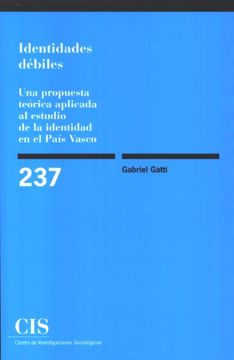Identidades Débiles: Una Propuesta Teórica Aplicada al Estudio de la Identidad en el País Vasco
Reseña del libro "Identidades Débiles: Una Propuesta Teórica Aplicada al Estudio de la Identidad en el País Vasco"
Aparte de analizar un caso, el del País Vasco, donde la identidad sigue constituyendo algo espectacular para la mirada del sociólogo, este libro aspira también a proponer un modelo de análisis teórico y de acercamiento empírico -un modelo de alcance intermedio- útil para estudiar las identidades débiles, es decir, adecuado para analizar las formas de pertenencia que se erigen en posiciones de uso y consumo de identidades más consolidadas. Es un modelo que se quiere complejo, pues comprende las viejas figuras que contienen nuestras pertenencias -las modalidades fuertes de la identidad-, también las sociologías que les son solidarias, por supuesto las formas de reapropiarse de esas viejas identidades -las que dan título al texto, las identidades débiles-, y, en fin, las sociologías que estas prácticas de reapropiación en que consisten las identidades débiles requieren, que no son sociologías fáciles, pues tienen que bregar con lo que se escapa de la mirada sociológica.How can those outside the centres of Basqueness and their sacred emblems make the name which the latter define their own? How is the figure of the non-member dealt with in the Basque Country? The question was difficult to answer for many years, a time of identity architectures built on distinctions which established significant differences between Us and Them, in that they did not give cause to consider changes in identity unless they were wholesale, radical, full-time. During that period, Basques were born, not made. But in recent years, perhaps decades, the Basque Country, much like the rest of the world, has seen how things have become much more complicated in the identity arena, with the arrival of more flexible, ambiguous and polysemic forms of representing and experiencing belonging, whereby that identity arena has found room for vaguer, more permeable and weaker senses of belonging. One of the forms taken by these new modalities of belonging is that associated with the world of learning euskera. By studying this process, and the people, places and rituals involved, we see that it is now thinkable to do something that constituted a paradox for older identity visionaries: learning to be, learning to be Basque. But weak identities in the Basque Country are no more than a pale reflection of the many forms which these modalities acquire in the contemporary landscape: diverse precarious situations, widespread alien statuses, vague implications, scattered identifications... Therefore, apart from analysing one case, that of the Basque Country, where identity still constitutes a spectacular sight for the sociologist, this book also sets out to propose a model of theoretical analysis and empirical approach -a model of intermediate scope- which is useful for studying weak identities, that is, suitable for analysing the forms of belonging which are now in a position to use and consume more consolidated identities. The model is intended to be complex, since it includes the old modes which contain our senses of belonging -the strong modalities of identity-, as well as the sociologies which they share in common and, of course, the forms of re-appropriating those old identities -the weak identities of the book's title-, and, in short, the sociologies required by these re-appropriation practices of which weak identities consist, which are not easy sociologies, since they have to contend with what escapes the sociological gaze.

